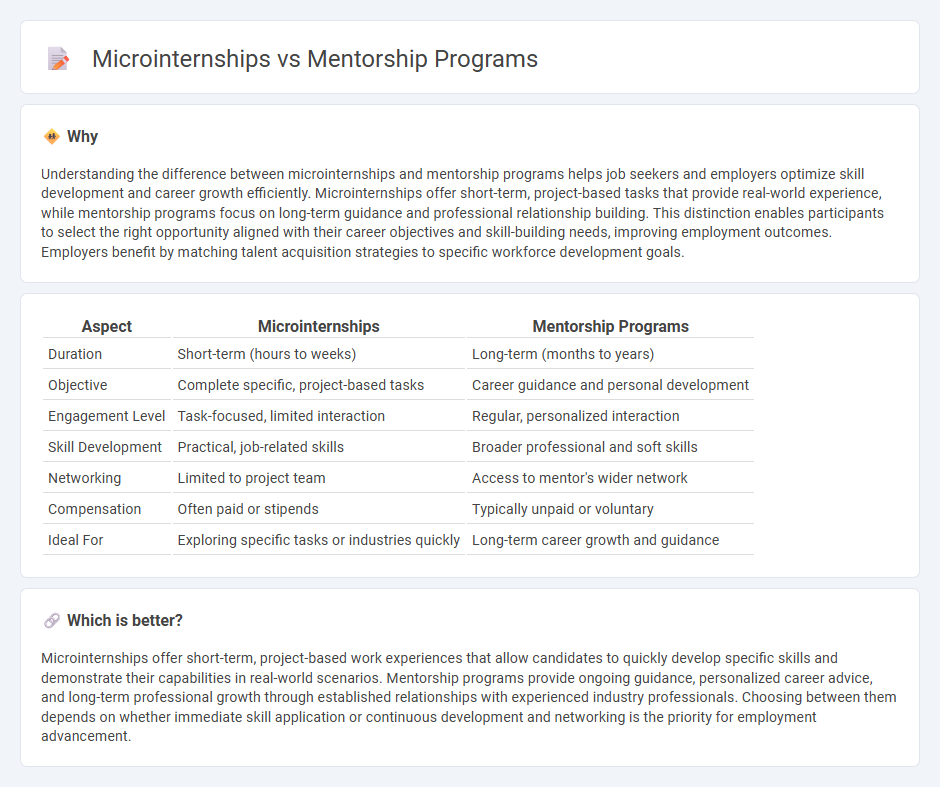
Microinternships offer short-term, project-based work experiences that provide practical skills and immediate contributions to employers, contrasting with mentorship programs focused on long-term guidance and professional development. These brief, flexible assignments enhance resumes quickly and expose participants to real-world challenges in specific industries. Explore the benefits and differences between microinternships and mentorship programs to find the best fit for your career growth.
Why it is important
Understanding the difference between microinternships and mentorship programs helps job seekers and employers optimize skill development and career growth efficiently. Microinternships offer short-term, project-based tasks that provide real-world experience, while mentorship programs focus on long-term guidance and professional relationship building. This distinction enables participants to select the right opportunity aligned with their career objectives and skill-building needs, improving employment outcomes. Employers benefit by matching talent acquisition strategies to specific workforce development goals.
Comparison Table
| Aspect | Microinternships | Mentorship Programs |
|---|---|---|
| Duration | Short-term (hours to weeks) | Long-term (months to years) |
| Objective | Complete specific, project-based tasks | Career guidance and personal development |
| Engagement Level | Task-focused, limited interaction | Regular, personalized interaction |
| Skill Development | Practical, job-related skills | Broader professional and soft skills |
| Networking | Limited to project team | Access to mentor's wider network |
| Compensation | Often paid or stipends | Typically unpaid or voluntary |
| Ideal For | Exploring specific tasks or industries quickly | Long-term career growth and guidance |
Which is better?
Microinternships offer short-term, project-based work experiences that allow candidates to quickly develop specific skills and demonstrate their capabilities in real-world scenarios. Mentorship programs provide ongoing guidance, personalized career advice, and long-term professional growth through established relationships with experienced industry professionals. Choosing between them depends on whether immediate skill application or continuous development and networking is the priority for employment advancement.
Connection
Microinternships provide short-term, project-based work experiences that allow mentees to apply skills in real-world settings, complementing traditional mentorship programs focused on guidance and professional development. These programs intersect by enabling mentors to offer targeted feedback on microinternship projects, fostering skill acquisition and career growth. Integrating microinternships with mentorship increases employment readiness by combining experiential learning with personalized support.
Key Terms
Career Development
Mentorship programs offer personalized guidance and long-term career development through one-on-one relationships with industry experts, fostering skill growth and professional networking. Microinternships provide short-term, project-based experiences that deliver practical skills and real-world exposure, enabling quick skill acquisition and resume enhancement. Explore the benefits of both to determine the best fit for advancing your career trajectory.
Skill Building
Mentorship programs provide personalized guidance and long-term support, fostering deep skill development through continuous feedback and professional growth opportunities. Microinternships offer short-term, project-based experiences that build targeted skills quickly, allowing participants to gain practical knowledge and portfolio assets in specific areas. Explore the distinct benefits of both approaches to determine which best enhances your skill-building journey.
Networking
Mentorship programs create long-term networking opportunities by connecting mentees with experienced professionals who provide guidance, industry insights, and career advice. Microinternships offer short-term, project-based networking experiences that allow participants to showcase skills and build relationships with employers in specific fields. Explore how both approaches can strategically expand your professional network and accelerate career growth.
Source and External Links
Mentorship Programs in the Workplace: Your 2025 Ultimate Guide - Mentorship programs are structured relationships focused on transferring knowledge, skills, and experience, and they come in several forms, including traditional, reverse, and group mentorship, each designed to support different types of professional development and organizational goals.
The Ultimate Guide to Structuring An Effective Mentorship Program - Building an effective mentorship program involves defining clear objectives, selecting the best format (e.g., one-on-one, group, peer, or reverse mentoring), and implementing a structured matching process, supported by tools and regular evaluation to ensure ongoing impact and alignment with organizational goals.
What Are Mentorship Programs? 9 Important Questions for Leaders - Mentorship programs systematically connect experienced and less experienced team members to foster professional growth, using software-driven matching and progress tracking to streamline administration and enhance the effectiveness of developmental relationships.
 dowidth.com
dowidth.com